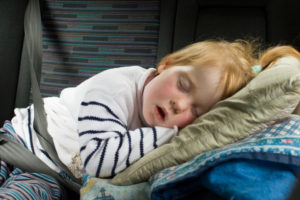 Your child’s performance seems to be slipping at school. You also notice that they complain of headaches frequently. You’ve gone to the eye doctor, but nothing’s wrong there. You’re at a loss as to what to do next. Did you know that your child could be suffering from sleep apnea? Here are some of the telltale signs of sleep apnea in children.
Your child’s performance seems to be slipping at school. You also notice that they complain of headaches frequently. You’ve gone to the eye doctor, but nothing’s wrong there. You’re at a loss as to what to do next. Did you know that your child could be suffering from sleep apnea? Here are some of the telltale signs of sleep apnea in children.
Obstructive Sleep Apnea (OSA)
This is the most common form of sleep apnea in both adult and children, and it occurs when the airway is blocked, which causes your child to stop breathing during sleep. For children, tonsils or adenoids that are enlarged most commonly cause the airway obstruction. Certain medical conditions such as Downs Syndrome or Cerebral Palsy may also increase your child’s risk of developing sleep apnea.
Symptoms of Sleep Apnea in Children
If your child is suffering from sleep apnea, you may notice that they have difficulty concentrating or focusing throughout the day. They may also have growth issues or concerns with heart problems. Sleep apnea can also contribute to headaches and behavior issues at school or at home.
Some symptoms to be aware of are:
- Loud snoring at night
- Breathing with pauses, gasps, or coughing during sleep
- Restless sleep in unusual positions
- Bedwetting
- Chronic sleepiness or fatigue during the day
If you notice some of the signs or symptoms of sleep apnea in your child, contact their physician. They may recommend a sleep study to determine if your child does have sleep apnea and the level of severity.
Treating Sleep Apnea
If tonsils are the cause of your child’s OSA, your doctor may recommend that a specialist remove them. CPAP, or continuous positive airway pressure therapy may also be an option for your child. This involves wearing a mask at night during sleep that delivers a continuous flow of oxygen designed to open your child’s airway for free breathing at night.
Many patients feel uncomfortable or claustrophobic wearing the CPAP mask while they sleep, so Dr. Pamela West offers an alternative therapy for children with sleep apnea by using a customized oral appliance.
The appliance is similar to a sport guard, however it’s designed to slightly reposition the jaw and open the airway for free breathing at night. It’s easy to get used to wearing and comfortable to wear during sleep.
If you have concerns that your child might be suffering from sleep apnea, and you’re interested in alternative children’s sleep apnea therapy in Las Vegas, contact our office today to learn more about how Dr. West can help your child.
